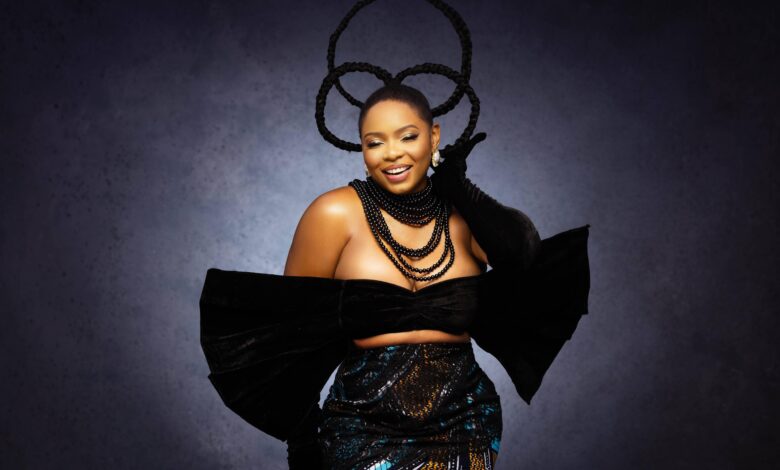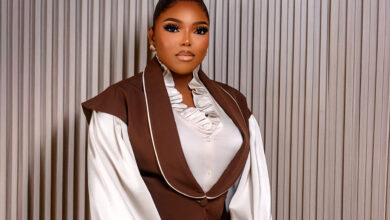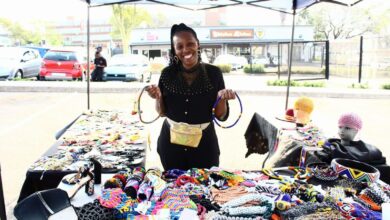Afropop Legend Yemi Alade On New Album, ‘Rebel Queen,’ Historic Hits, & Working With Beyoncé

Before Afrobeats icons Burna Boy, WizKid, and Tyla became globally recognized household names, Yemi Alade was the continent’s biggest pop star. On July 26, she will release her sixth studio album, Rebel Queen, which expands her repertoire with a world of adventurous pop sounds.
The Nigerian singer/songwriter burst onto the African pop music scene in 2014 with “Johnny,” a now-classic tune that gained acclaim by its iconic video featuring a TV news reporter tracking the titular womanizer. The video made her the first Nigerian female artist to hit 100 million views on YouTube.
Since then, Alade has had an illustrious career, collaborating with artists including Rick Ross, earning another 100 million-view video for “Oh My Gosh,” and featuring alongside fellow Africans Mr. Eazi and Tekno on the Beyoncé-curated soundtrack for The Lion King.
Her latest album, Rebel Queen, includes high-profile collaborations with Angélique Kidjo, Ziggy Marley, and dancehall star Konshens. The album promises a genre-jumping journey across the globe, incorporating amapiano (“Soweto to Ibiza”), highlife (“Chairman”), and even reggae (“Peace and Love”) and dancehall (“Bop’).
Ahead of Rebel Queen’s release, GRAMMY.com caught up with Alade about her progression as an artist, what it was like to work with Beyoncé and her team, and bridging international success.
This interview has been edited for clarity and length.
Your new album, ‘Rebel Queen‘, contains influences from all over Africa and beyond. Was that intentional?
Yes, you’re correct that I wanted to make sure that the album had sounds that I actually genuinely love, from the amapiano influence to dancehall. And also, I personally wanted to go back to the foundation of Afrobeats, which are sounds and genres that I listened to growing up as a kid. When my parents took me to family parties, there were certain melodies and guitar strums that I fell in love with. And I wanted to revisit those nostalgic moments and put it all in this album.
There are a lot of high-profile collaborations on this record, such as Anjélique Kidjo and Ziggy Marley. How did you decide who to work with on ‘Rebel Queen‘?
Honestly my life is a roller coaster, same for every touring artist. We try to gather as much as we can while being in motion. Anjélique Kidjo is like my music mum, I love her. And when I made the record, “African Woman,” who else would I feature on such a song if not Anjélique? And as for Ziggy, he and I have a song that we did previously (“Look Who’s Dancing Now“), which was his song, and he featured me. And I wanted a tit-for-tat moment. So I sent the song to him. I felt like, who else but him? Every feature was necessary to complete the melody for each song, they are such a huge part of each one, not just in the fresh vibe that they bring.
Learn more: Watch Yemi Alade’s Enchanting Performance Of “Tomorrow” | Global Spin
It’s been ten years since you broke out with the massive hit “Johnny.” Back then, African pop music was relatively unknown in America. Since then, African artists have gained global recognition. Do you see yourself as a pioneer for the current Afropop movement?
I agree with you 100 percent, there is no way you authentically go through the history of, you know, building a bridge between Africa and the rest of the world via music without mentioning a song like “Johnny.” It’s definitely an honor for me to be the vessel that delivers such amazing music to the world. Of course, there were people way before me who also did the same thing. We’re talking about Fela [Kuti]. We’re talking about King Sunny Ade. At the end of the day, yes, music is metamorphosing into so much more. And definitely, I’m a pioneer [laughs].
You have a strong sense of storytelling, especially in your music videos. “Johnny” has an entire storyline about a news reporter investigating a womanizer. How important is that kind of storytelling to your music?
Storytelling is a big part of my artistry, because I feel everybody loves a good story. I find that even when I’m writing most times in the studio, there’s always a picture I’m trying to paint, and it only makes sense for the visuals to kind of match that most of the time. Except sometimes we decide to make it a performance video because I just feel like dancing.
What’s the most memorable video you’ve ever done?
Every one of my videos has taken a lot of pain, sweat, and even some tears. But I think “Johnny” is such a masterpiece, because it resonated with the entire world, and Africa especially. And it pretty much helped me to stay on my way through the industry, because it became my identity. That song and that video was the platform for the brand and everything that I am today. you know, so that is definitely the most memorable, in a good way.
You’ve traveled to and performed in America several times in your career. What’s your overall impression?
I think I’ve done four or five American tours. And yo, America is so big [laughs]. My first American tour had me in shambles, because of the flights. I didn’t realize that to go from one city to another, I might have to connect once or twice depending on how far I’m going. So the flights had me in shambles, but the energy of the people? Oh my days, lit! America is definitely one of my favorite places. I’m always reminding my agents to make sure that they include American cities on my tours, which is why even for the album listening parties for Rebel Queen, we did the first one in Paris, then London, and then we had to come to New York as well. And then just yesterday, we had one in Lagos as well.
Since you first became popular, a lot of Afrobeats artists have gained a following abroad like Burna Boy and WizKid. It seems as though, at least looking at the artists that break outside of Africa, that the genre is still very male-dominated. Do you agree with that? And do you think there’s potential for more female artists to break out internationally?
Honestly, when I started out, the odds were really way more against women than they are right now, in that, there were female artists sprouting maybe once every two years, or once every year, and barely hanging around long enough. But now, the story is different. And I give kudos to all the women before me and all the women with me. Yes, in a male dominated society, it seems as though my male counterparts get their roses and their flowers for a second. And you know, once in a while someone comes back and remembers, “Oh, there’s Yemi Alade.” Do you know what I mean?
I was speaking to someone earlier today and I was saying, I think what surprises me the most is that, I feel like there are no expectations of female artists. So like, if we do or we don’t, people are just moving on. But I’m not the one to play victim, never. Despite the odds, you see that the females continue to be resilient, because we know. I know deep within that my existence is definitely of value to so many people out there.
What do you think of the upcoming generation of talent like Tems and Ayra Starr and Tyla, who recently won the first GRAMMY Award for Best African Music Performance for “Water?”
Exceptional, exceptional artists. As you just mentioned, they’re doing amazingly well. And, you know, these women are unique in their own ways. And I want to just say that I believe it’s just the starting point for them. There’s so much to come. And there’s so many other females that are still en route to greatness.
How have you seen the music industry in Africa evolve? And what sorts of challenges do you think African musicians face today?
I personally feel like, with all the momentum that Afrobeats has got, we need authentic platforms that can actually check the streaming numbers that are coming in for music, especially within Africa. Because at the moment it’s mostly Apple, Spotify, etc. But there are other platforms here in Africa that most Africans use, and they have more of a database compared to Apple and Spotify. We’ve come to a point where we need to have more credible numbers, because there’s millions of people streaming music in Africa that are not on those platforms.
So you think that these local platforms need to be counted alongside Apple and Spotify?
100 percent. In Nigeria there’s two: Audiomack and Boomplay. Boomplay is a big deal.
You’re going on a decade in the industry. In all that time, what’s one moment or one achievement that gives you the greatest sense of accomplishment? What are you most proud of in your career?
That’s a big question…I think I have an idea, because there’ve been so many moments in my life and in my career that have aligned with my dreams coming true. Number one is each time that I’m approached by a complete stranger and the stranger tells me “Oh my God, Yemi. You don’t know what your music has done for me. Your music has gotten me through so much grief.” Some people walk up to me and tell me that they just had the biggest struggle in their life and they listen to my music, and it always sends them into a realm of joy and happiness. Honestly, I feel accomplished in those moments, because when I record my music, I always say, the thing I’m trying to spread through my music the most is love, joy and happiness. So to have people testify to that, it means to me that the magic is complete, that my job is actually effective. So that makes me feel very accomplished.
On a personal note, an accomplishment that I am most grateful to is the fact that I’m always able to comfortably take care of my family. It’s something that I would never play down. You know, I’m just grateful to God for that.
And lastly, aside from winning a GRAMMY through Angelique Kidjo — you know, I’ve met a lot of amazing people, and Beyoncé is one of them. So at the end of the day, it’s a full circle moment for me. I’m just enjoying the ride.
You know, it’s funny you mentioned Beyoncé, I was just about to ask you what it was like to work with her.
Oh my days — wow, working with her, it was such an experience for myself and my team. It was like, we’re literally awake, walking in the dreams that we have dreamt for so long.The process of her team contacting us was a bit weird, because my management didn’t realize that Parkwood [Entertainment] was a real company, that they were emailing them and talking about Beyoncé. They assumed that it was some kind of scam artist. But when they had sent it to me, I was like “What? Parkwood? Who doesn’t know Parkwood is Beyoncé?”
So it turned out that it was for real, and we went to L.A. where the studio was, and I lost my voice for 24 hours — I couldn’t talk, I couldn’t sing. I just soaked up all the vitamin C’s and hot teas and Throat Coats I could get. I managed to regain a little bit of my voice back and that’s what I was able to record that day. That was a miracle for me. But one of the most memorable moments was actually meeting her in person. After the album, Lion King, came out, the movie was being premiered in London, and I happened to be in London at that time. We had met her in person, we met Jay Z. It was such a full circle moment. Honestly, that lady has really touched my life in a way that I will never forget. Because she could have lived her life without doing what she did, but she decided to reach out to people she felt were pillars of African music and pay homage to Africa. And I’m happy to have been part of that moment.




